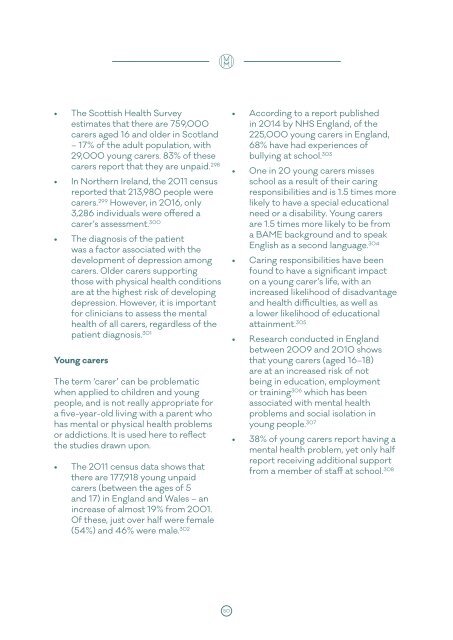FUNDAMENTAL FACTS ABOUT MENTAL HEALTH 2016
fundamental-facts-about-mental-health-2016
fundamental-facts-about-mental-health-2016
You also want an ePaper? Increase the reach of your titles
YUMPU automatically turns print PDFs into web optimized ePapers that Google loves.
• According to a report published<br />
• The Scottish Health Survey<br />
(54%) and 46% were male. 302<br />
estimates that there are 759,000<br />
carers aged 16 and older in Scotland<br />
– 17% of the adult population, with<br />
29,000 young carers. 83% of these<br />
in 2014 by NHS England, of the<br />
225,000 young carers in England,<br />
68% have had experiences of<br />
bullying at school. 303<br />
carers report that they are unpaid. 298<br />
• One in 20 young carers misses<br />
• In Northern Ireland, the 2011 census<br />
reported that 213,980 people were<br />
carers. 299 However, in <strong>2016</strong>, only<br />
3,286 individuals were offered a<br />
carer’s assessment. 300<br />
school as a result of their caring<br />
responsibilities and is 1.5 times more<br />
likely to have a special educational<br />
need or a disability. Young carers<br />
are 1.5 times more likely to be from<br />
•<br />
a BAME background and to speak<br />
The diagnosis of the patient<br />
English as a second language.<br />
was a factor associated with the<br />
development of depression among<br />
carers. Older carers supporting<br />
those with physical health conditions<br />
are at the highest risk of developing<br />
depression. However, it is important<br />
for clinicians to assess the mental<br />
health of all carers, regardless of the<br />
• Caring responsibilities have been<br />
found to have a significant impact<br />
on a young carer’s life, with an<br />
increased likelihood of disadvantage<br />
and health difficulties, as well as<br />
a lower likelihood of educational<br />
attainment. 305<br />
patient diagnosis. 301<br />
Young carers<br />
The term ‘carer’ can be problematic<br />
when applied to children and young<br />
people, and is not really appropriate for<br />
a five-year-old living with a parent who<br />
has mental or physical health problems<br />
• Research conducted in England<br />
between 2009 and 2010 shows<br />
that young carers (aged 16–18)<br />
are at an increased risk of not<br />
being in education, employment<br />
or training 306 which has been<br />
associated with mental health<br />
problems and social isolation in<br />
young people. 307<br />
or addictions. It is used here to reflect<br />
• 38% of young carers report having a<br />
the studies drawn upon.<br />
mental health problem, yet only half<br />
•<br />
report receiving additional support<br />
The 2011 census data shows that<br />
from a member of staff at school. 308<br />
there are 177,918 young unpaid<br />
carers (between the ages of 5<br />
and 17) in England and Wales – an<br />
increase of almost 19% from 2001.<br />
Of these, just over half were female<br />
50


